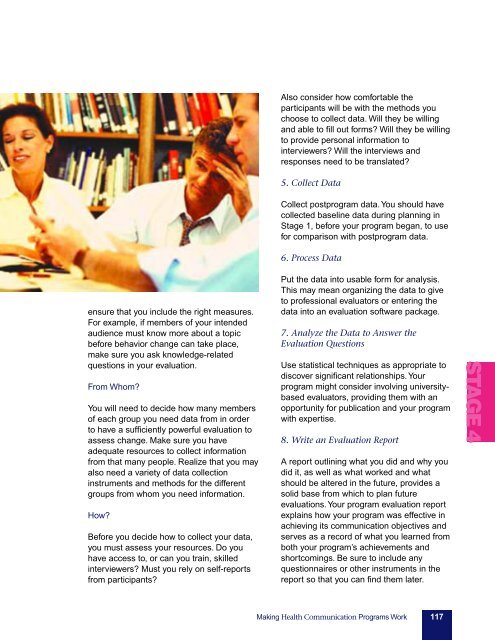pink-book
pink-book
pink-book
Create successful ePaper yourself
Turn your PDF publications into a flip-book with our unique Google optimized e-Paper software.
ensure that you include the right measures.<br />
For example, if members of your intended<br />
audience must know more about a topic<br />
before behavior change can take place,<br />
make sure you ask knowledge-related<br />
questions in your evaluation.<br />
From Whom<br />
You will need to decide how many members<br />
of each group you need data from in order<br />
to have a sufficiently powerful evaluation to<br />
assess change. Make sure you have<br />
adequate resources to collect information<br />
from that many people. Realize that you may<br />
also need a variety of data collection<br />
instruments and methods for the different<br />
groups from whom you need information.<br />
How<br />
Before you decide how to collect your data,<br />
you must assess your resources. Do you<br />
have access to, or can you train, skilled<br />
interviewers Must you rely on self-reports<br />
from participants<br />
Also consider how comfortable the<br />
participants will be with the methods you<br />
choose to collect data. Will they be willing<br />
and able to fill out forms Will they be willing<br />
to provide personal information to<br />
interviewers Will the interviews and<br />
responses need to be translated<br />
5. Collect Data<br />
Collect postprogram data. You should have<br />
collected baseline data during planning in<br />
Stage 1, before your program began, to use<br />
for comparison with postprogram data.<br />
6. Process Data<br />
Put the data into usable form for analysis.<br />
This may mean organizing the data to give<br />
to professional evaluators or entering the<br />
data into an evaluation software package.<br />
7. Analyze the Data to Answer the<br />
Evaluation Questions<br />
Use statistical techniques as appropriate to<br />
discover significant relationships. Your<br />
program might consider involving universitybased<br />
evaluators, providing them with an<br />
opportunity for publication and your program<br />
with expertise.<br />
8. Write an Evaluation Report<br />
A report outlining what you did and why you<br />
did it, as well as what worked and what<br />
should be altered in the future, provides a<br />
solid base from which to plan future<br />
evaluations. Your program evaluation report<br />
explains how your program was effective in<br />
achieving its communication objectives and<br />
serves as a record of what you learned from<br />
both your program’s achievements and<br />
shortcomings. Be sure to include any<br />
questionnaires or other instruments in the<br />
report so that you can find them later.<br />
STAGE 4<br />
Making Health Communication Programs Work 117


